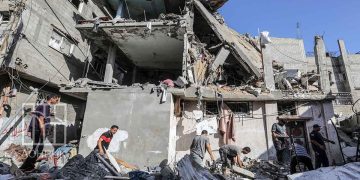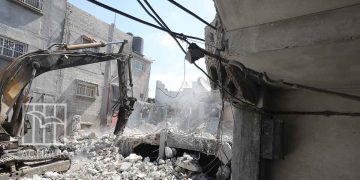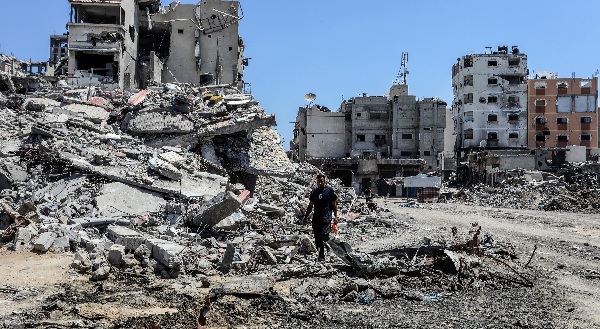Israeli military forces have escalated what observers describe as a campaign of mass killing in the Gaza Strip, with a new wave of airstrikes overnight and through Sunday morning resulting in the deaths and injuries of dozens of civilians, the majority of whom are women and children.
According to medical sources inside the territory, more than 125 Palestinians were killed since dawn, in what has become a recurring pattern of attacks targeting residential homes and makeshift shelters housing displaced individuals. Hospitals across Gaza remain in near-total collapse, with health staff unable to respond to the scale of the casualties amid ongoing shortages of electricity, clean water, and medical supplies due to the prolonged blockade.
Northern Gaza has borne the brunt of the latest attacks. In one incident, an airstrike struck a crowded home, killing at least eight civilians. The number of victims trapped beneath the rubble remains unknown, as recovery efforts are severely hindered by the destruction and continued shelling.
Temporary tents established by displaced families in previously designated “safe” areas have also been struck, highlighting the repeated and deliberate targeting of civilians attempting to flee previous bombardments. This practice has raised serious concern among humanitarian organisations regarding the systematic nature of attacks on those with no access to shelter or means of evacuation.
The continued strikes on displacement sites are viewed as part of a broader policy of collective eradication targeting Gaza’s civilian population. The scale and consistency of these attacks have led legal experts and human rights organisations to assess them as fitting within the legal definition of genocide.
Since the beginning of the Israeli military operation on 7 October 2023, more than 174,000 Palestinians have been killed or injured, including a significant majority of children and women. Over 11,000 individuals remain missing. The offensive has been conducted with full military and political support from the United States, despite growing calls for accountability.
The bombardment of homes, bakeries, hospitals, schools, and the obstruction of food and medical aid are being documented as clear indicators of a deliberate policy aimed at dismantling civilian life. Legal analysts point to Article II of the 1948 Convention on the Prevention and Punishment of the Crime of Genocide, noting that actions taken with the intent to destroy, in whole or in part, a national or ethnic group may amount to genocide under international law.
The continued failure of the international community to intervene meaningfully, or to initiate accountability mechanisms, has drawn accusations of complicity and has raised serious questions about the effectiveness of the international legal framework in preventing mass atrocities.
The military campaign unfolding in Gaza increasingly defies classification as a conventional armed conflict. Rather, the scope, intensity, and targeting patterns suggest a coordinated effort to eliminate a civilian population, both physically and psychologically.
Calls for a ceasefire have been accompanied by urgent demands for the activation of legal mechanisms to prosecute those responsible and to prevent further atrocities. With civilian infrastructure decimated and safe spaces extinguished, rights groups warn that what remains in Gaza is not only a humanitarian emergency but a legal and moral crisis that demands immediate international response.



























